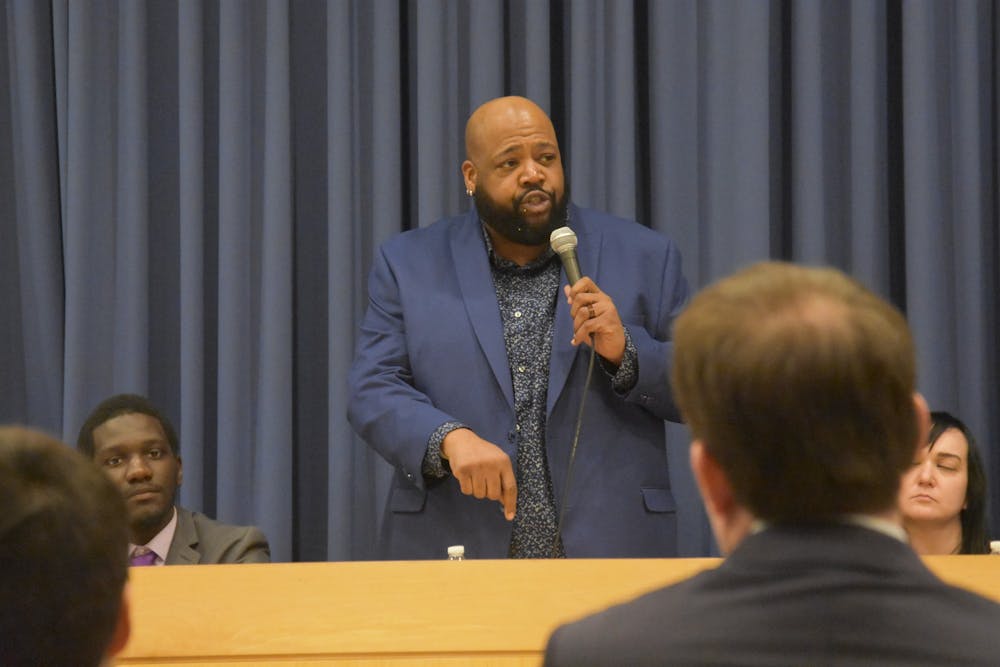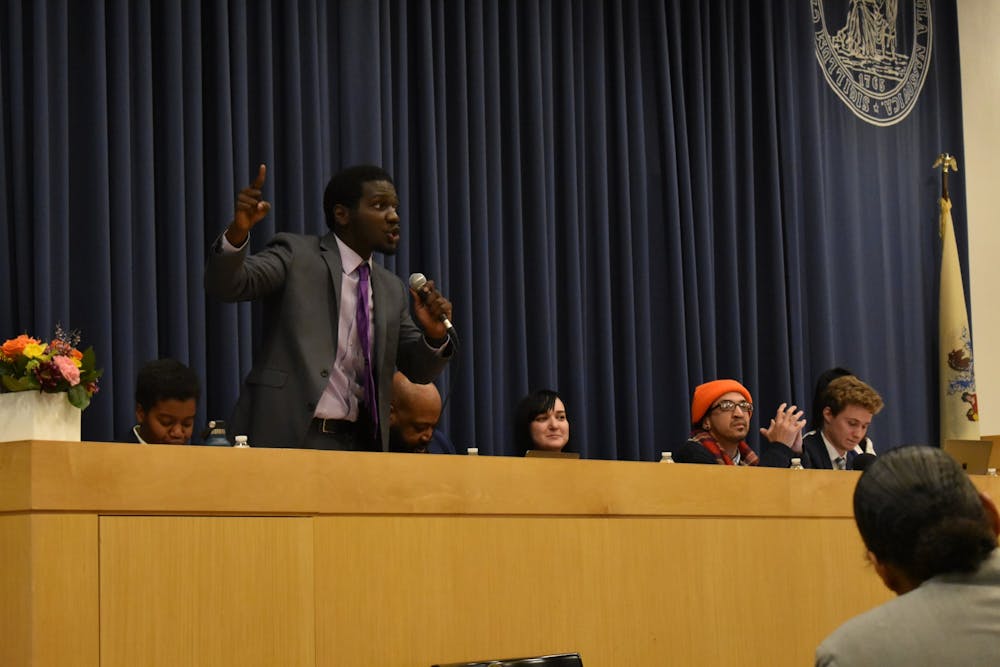On Thursday night, Princeton Debate Panel (PDP) members and formerly incarcerated individuals debated whether citizens serving sentences in the United States should be able to vote.
Two teams, each comprised of PDP students and members of the Rikers Debate Project — a group founded in 2016 that teaches competitive debate skills at several prisons — debated the question. The event, organized by the American Whig-Cliosophic Society, was held in the Whig Senate chamber. Parimal Garg, Deputy Counsel to Governor Phil Murphy, moderated.
Following an introduction from Whig-Clio Senate President Xiao-ke Lu ’23, Angela Cai ’09, a Rikers Debate Project board member and former PDP president, addressed the audience, which included dozens of students.
Cai recounted the organization’s founding in response to Department of Justice abuse investigations at Rikers Island, which “elucidated … the lack of programming for individuals who were incarcerated there.”
Last October, the New York City Council voted to shutter the jail complex at Rikers Island, long notorious for its harsh conditions and grievous abuses.
The organization started as an idea to use a debate team to give prisoners “some modicum of educational programming,” she added. Today, the Project teaches at prisons in New Haven and Washington, D.C., as well as several facilities on Rikers Island.
The PDP-Rikers teams were assigned sides by a coin toss. The government team — consisting of Rikers Debate Project member Lewis Conway and PDP members Julia Chaffers ’22 and Terrell Seabrooks ’21 — argued for allowing incarcerated individuals to vote.
Chaffers is a senior columnist for The Daily Princetonian.

The opposition, arguing against the motion, consisted of PDP’s Greg Weaving ’22 and Rikers Debate members Camilla Broderick and Felix Guzman.
Conway, Broderick, and Guzman are formerly incarcerated individuals.
In their arguments, the teams raised issues of racial inequality, human dignity, retributive justice, and the possibility that incarcerated voters would lean Democratic if granted voting rights. Both sides acknowledged the profound racial disparities that characterize the American criminal-justice system.
After Chaffers and Seabrooks spoke in favor of the motion, and Broderick and Guzman in opposition, the floor opened to students in the audience. Those who spoke elaborated on points raised by the speakers or shared new arguments and observations.

Subsequently, Conway and Weaving delivered the two team’s closing remarks, respectively.
In his speech, Conway emphasized the carceral system’s origins in slavery.
“We have to discuss why we’re so quick to skip over the fact that slavery’s at the root of it. It’s because slaves were denied the right to vote that we feel it’s okay to deny prisoners the right to vote,” said Conway. “We want people to be able to vote not because it’s a partisan issue, but because it’s a human issue.”

Lewis Conway, a Rikers Debate Project member, delivers closing statements.
Photo Credit: Mark Dodici / The Daily Princetonian
Eight guests served as judges. They were Blue Harbor Group Managing Director Dave Silverman, Chief Policy Advisor to Bill De Blasio Dom Williams, American Civil Liberties Union Smart Justice Chair Udi Ofer, Clemson Professor of Philosophy Brookes Brown, Social Work Liaison Dameon Stackhouse, and formerly-incarcerated voting right advocates Roland Pierce and Antonne Henshaw.
As the judges deliberated, the debaters took questions from the audience. Simultaneously, students submitted ballots for a floor vote. During the Q&A, Guzman stressed the importance of volunteering in one’s community, arguing that “people should be active in their communities at all times.”
All eight judges voted in favor of the motion to allow incarcerated individuals to vote. Additionally, six of the seven floor-allotted votes — votes determined by audience support — fell in favor of the motion, leading to a final count of 14–1 in favor.

Students spectate and ask questions
Photo Credit: Mark Dodici / The Daily Princetonian
In an interview with the ‘Prince,’ Cai elaborated on why she felt the event was so important. She stated that she wants people interested in debate to know that “there is a whole other marketplace [of ideas] behind bars that many people want to contribute to.”
“This was an excellent manifestation of bringing the marketplace of ideas to expand to include formerly incarcerated people,” Cai said. “And we’re only able to bring the formerly incarcerated voices to forums like these, but through our organization and if people want to volunteer with us we can bring that into jails and prisons as well.”
The event took place Thursday evening at 7 p.m. and was co-sponsored by the American Whig-Cliosophic Society, the Carl A. Fields Center, the Department of African American Studies, the Princeton Debate Panel, Students for Prison Education and Reform (SPEAR), and the Rikers Debate Project.








